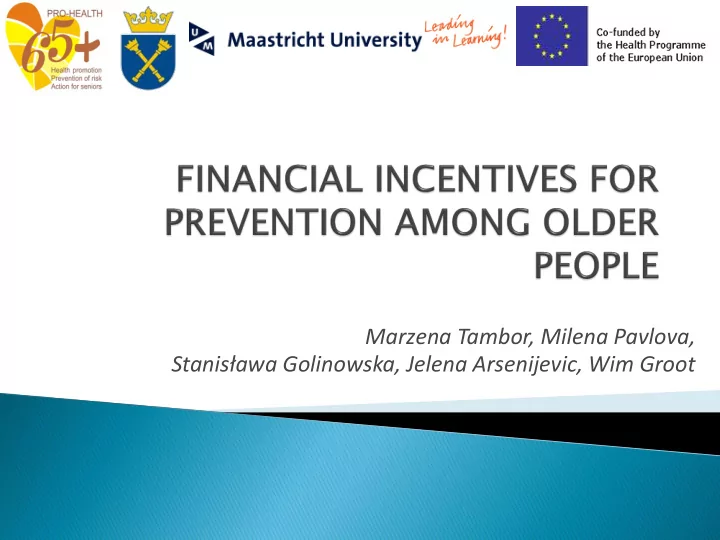

Marzena Tambor, Milena Pavlova, Stanisława Golinowska, Jelena Arsenijevic, Wim Groot
Health prevention Prolonging life in good health, reducing health care cost Need to encourage people to change their health-related behavior and increase consumption of preventive services Financial incentives (cost and benefits determine behavior)
To review the recent evidence on the role of financial incentives in health promotion and prevention among older persons
Elderly OR old OR senior OR aged • AND Health promotion OR primary prevention OR screening • AND Incentive OR motivation OR stimulus • AND OR economic OR financial OR tax OR insurance OR payment OR monetary OR pay for performance OR cost sharing OR co payments OR co insurance OR deductible Financial OR fee OR charge OR free of charge OR bonus
Elderly derly No age limit Healt alth h • Health promotion and primary prevention promotion omotion • Screening • Positive (reward) and negative (penalty) • Explicit (e.g. cash payment for behavior) and implicit Fina nancia cial l (e.g. increasing/decreasing price of product/service) inc ncen entiv ives es • Targeted directly at the elderly and at health care providers Time ime Last 10 years Loc ocat atio ion No limits • Only English publications Study udy • Full text publications char harac acteristics teristics • Excluding discussion papers, opinion papers and editorials
INCENTIVE CHARACTERISTICS: INCENTIVE EFFECTIVENESS: - What incentives and for what? - What are the costs, effects and benefits? - For whom are the incentives? - What are the major barriers for implementation? - How are incentives implemented and by whom? - What are the major design drawbacks? - Where and what location/country features? - What examples of good practices?
Identified during the initial search n = 1254 54 Excluded because Included in the published >10 initial screening years ago n = 838 n = 416 Included Excluded as potentially due to irrelevance relevant n = 598 n = 240 n Included Excluded during Excluded because as relevant after the second the text could not the second screening due to be downloaded screening irrelevance n = 2 n = 19 n = 219
Small number of studies (mostly non-European) and their large heterogeneity No conclusive results on the effectives of financial incentives The effectiveness of financial incentives might depend on duration of intervention, level and type of incentive and contextual factors Acceptability of financial incentives for changing health consumer behavior is limited
Thorough analysis of the content of the papers Reviewing the reference lists of the publications selected as relevant Searching other databases Reviewing studies that include elderly as a subgroup of the study sample
This presentation arises from the project Pro-Health65+ which has received funding from the European Union, in the framework of the Health Programme (2008-2013). The content of this presentation represents the views of the author and it is his sole responsibility; it can in no way be taken to reflect the views of the European Commission and/or the Executive Agency for Health and Consumers or any other body of the European Union. The European Commission and/or the Executive Agency do(es) not accept responsibility for any use that may be made of the information it contains.
Recommend
More recommend